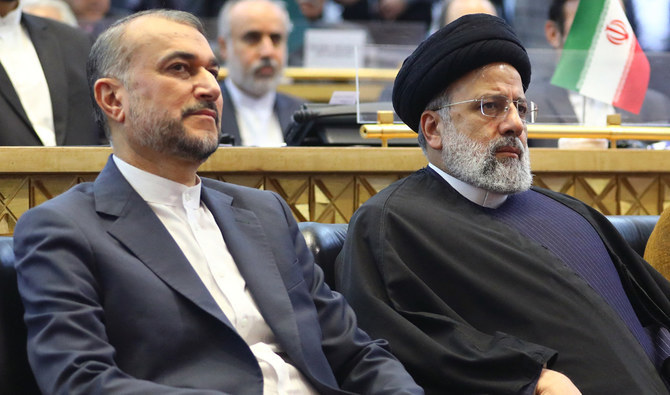LONDON: Iranian President Ebrahim Raisi was confirmed dead on Monday after search-and-rescue teams found his crashed helicopter in a mountainous region of northern Iran, close to the border with Azerbaijan.
Killed alongside Raisi were Foreign Minister Hossein Amir-Abdollahian and seven others, including the crew, bodyguards and political and religious officials.
Iran’s Supreme Leader Ayatollah Ali Khamenei has assigned Vice President Mohammad Mokhber to assume interim duties ahead of elections within 50 days. Ali Bagheri, the country’s one-time top nuclear negotiator, was appointed as acting foreign minister.
Iranian authorities first raised the alarm on Sunday afternoon when they lost contact with Raisi’s helicopter as it flew through a fog-shrouded mountain area of the Jolfa region of East Azerbaijan province.
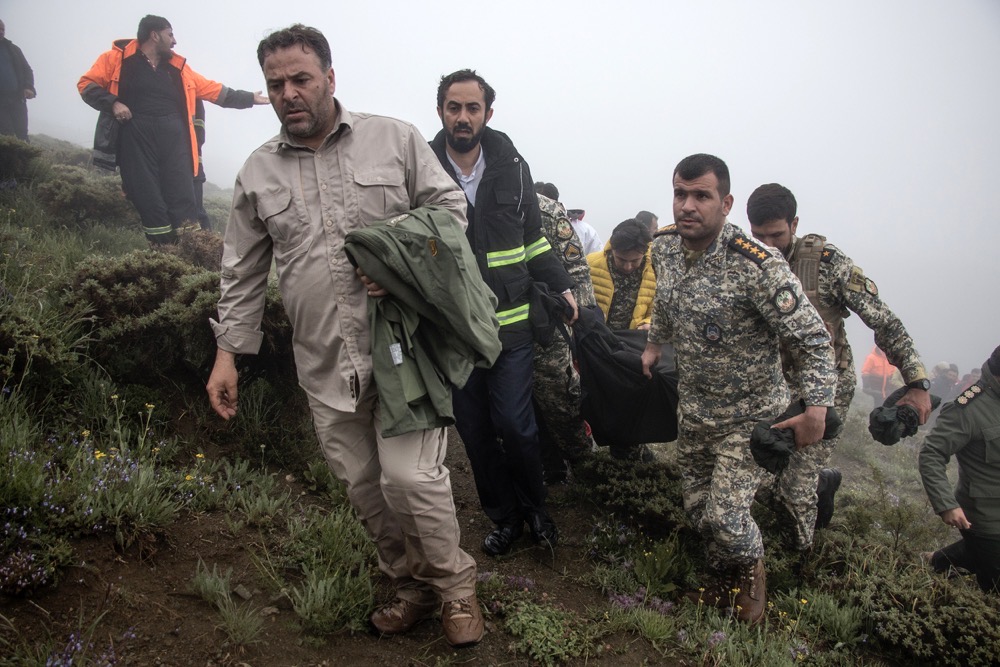
Iranian authorities first raised the alarm on Sunday afternoon when they lost contact with Raisi’s helicopter. (AP/Moj News Agency)
Raisi had earlier met Azerbaijan’s President Ilham Aliyev on their common border to inaugurate a dam project.
On the return trip, only two of the three helicopters in his convoy landed in the city of Tabriz, setting off a massive search-and-rescue effort, with several foreign governments soon offering help.
As the sun rose on Monday, rescue crews said they had located the destroyed Bell 212 helicopter — a civilian version of the ubiquitous Vietnam War-era UH-1N “Twin Huey” — with no survivors among the nine people on board.
State television channel IRIB reported that the helicopter had “hit a mountain and disintegrated” on impact.
Analysts have highlighted concerns about the safety of Iran’s civilian and military aircraft, many of which are in a poor state of repair after decades of US sanctions deprived the nation of new models and spare parts.
Iran has kept its civil and military aviation fleets flying during its isolation since the 1979 revolution through a combination of smuggled parts and reverse-engineering, according to Western analysts.
“Spare parts would have definitely been an issue for the Iranians,” Cedric Leighton, a retired US Air Force colonel, told CNN.
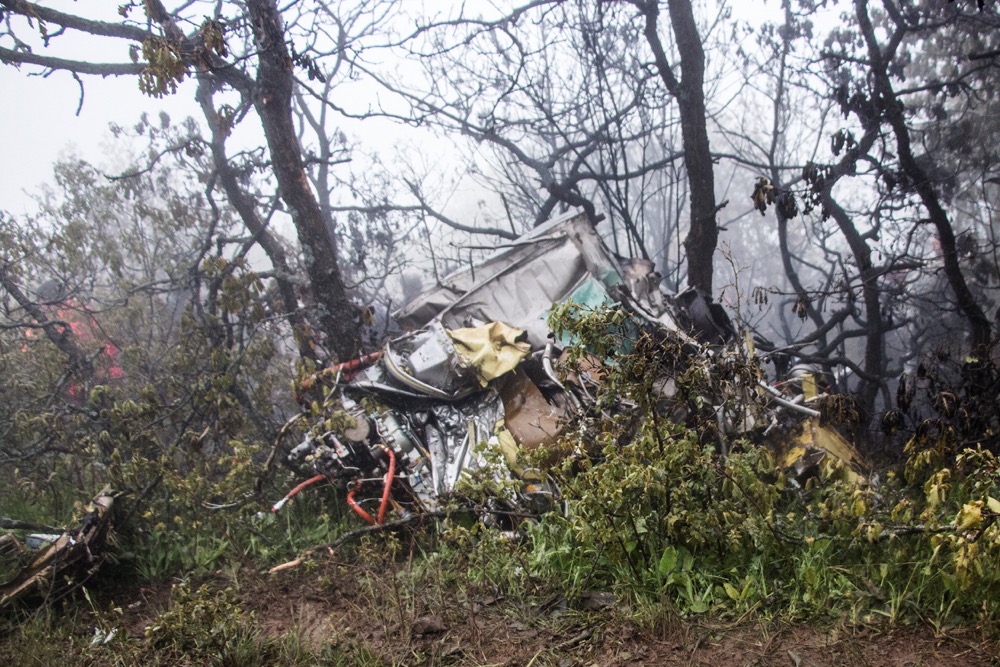
State television channel IRIB reported that the helicopter had “hit a mountain and disintegrated” on impact. (Reuters/West Asia News Agency)
“In this particular case, I think this confluence of spare parts, because of the sanctions, plus the weather, which was very bad over the last few days in this particular part of northwestern Iran.
“All of that, I think contributed to a series of incidents and a series of decisions that the pilot and possibly even the president himself made when it came to flying this aircraft … And unfortunately for them, the result is this crash.”
Sunday’s incident is only the latest in a long history of air disasters that have claimed the lives of world leaders since the dawn of aviation.
One of the first instances of a serving leader or head of state to die in an air accident was Arvid Lindman, the prime minister of Sweden, whose Douglas DC-2 crashed into houses in Croydon, south London, while attempting to take off in thick fog on Dec. 9, 1936.
As the age of aviation took off during the interwar period, more and more leaders began taking to the skies for diplomatic visits and to touch base with the more distant corners of their dominions.
On Sept. 7, 1940, Paraguayan President Jose Felix Estigarribia died in a plane crash just a year after taking office, followed in 1943 by Poland’s prime minister in exile, Wladyslaw Sikorski, who died on July 4, 1943, when his B24C Liberator crashed into the Mediterranean shortly after taking off from Gibraltar.
While aviation technology and safety rapidly advanced after the Second World War as more and more countries began establishing their own air forces and civilian commercial fleets, technical faults, bad weather, and foul play continued to claim lives.
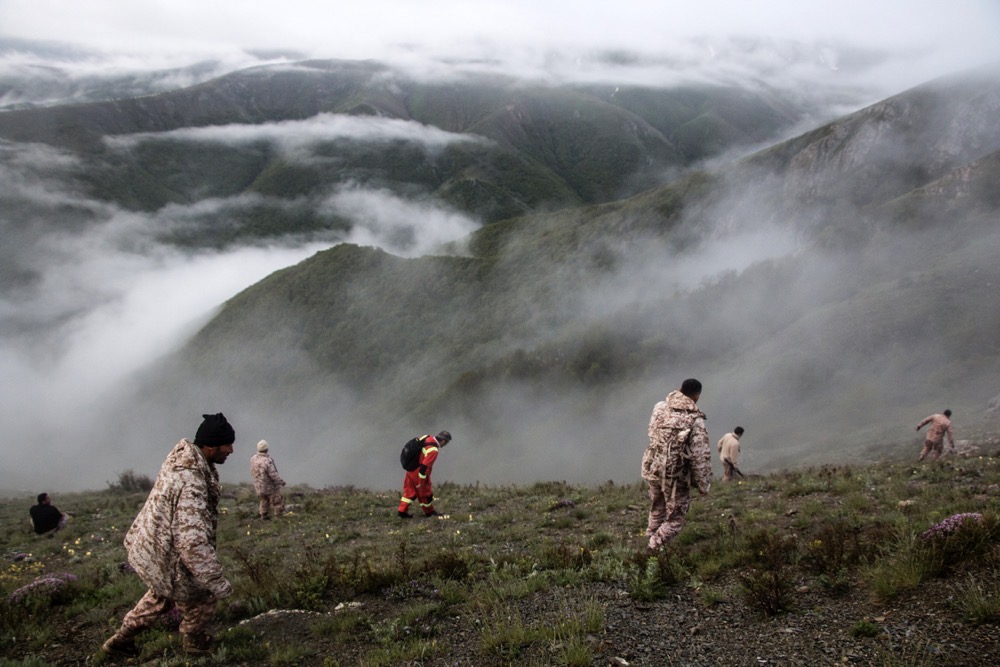
The top officials were found dead at the site of a helicopter crash on Monday after an hourslong search through a foggy, mountainous region. (AP/Moj News Agency)
On March 17, 1957, Ramon Magsaysay, the president of the Philippines, was killed when his plane crashed into Mount Manunggal in Cebu. A year later, on June 16, Brazil’s interim president, Nereu Ramos, died in a Cruzeiro airline crash near Curitiba Afonso Pena International Airport.
Africa has also seen its share of air disasters. On March 29, 1959, Barthelemy Boganda, president of the Central African Republic, died when his Atlas flying boxcar exploded in midair over Bangui.
Then, in 1961, Swedish economist and diplomat Dag Hammarskjold, who served as the second secretary-general of the UN, died when his Douglas DC-6B crashed into a jungle in Zambia on Sept. 18.
With the 1960s came the widespread adoption of helicopter flight in conflict zones, search-and-rescue operations, and increasingly as an efficient way for politicians, diplomats and business leaders to get around and land in areas without an airstrip.
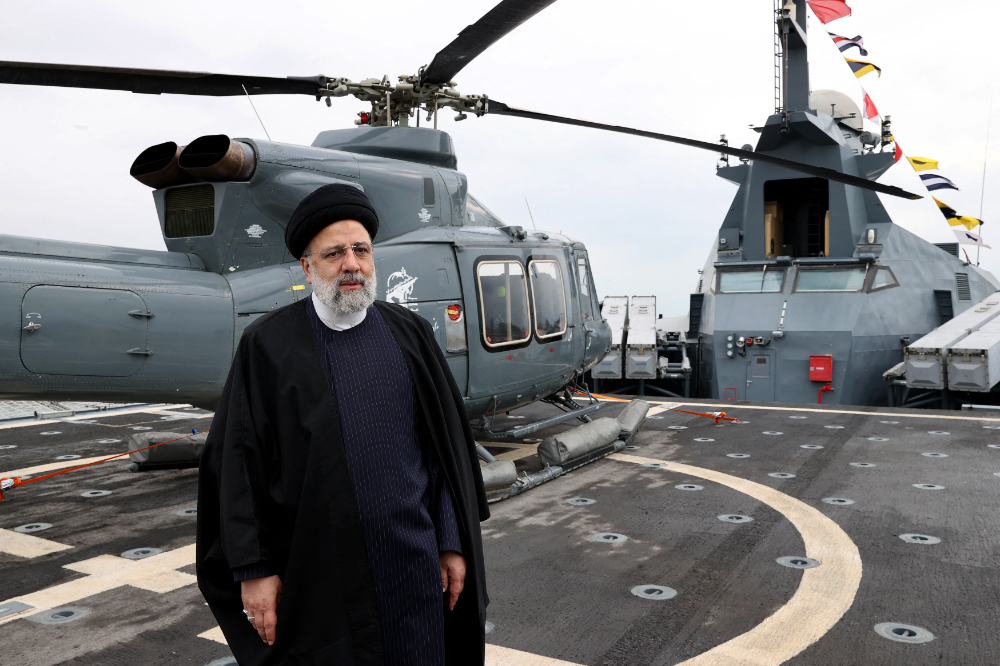
Sunday’s incident is only the latest in a long history of air disasters that have claimed the lives of world leaders since the dawn of aviation. (AFP)
Like fixed-wing aircraft, however, helicopters are not immune to bad weather conditions, obstacles, human error, sabotage or terrorism.
One of the first world leaders to die in a helicopter crash was Abdul Salam Arif, the president of Iraq, who reportedly died when his aircraft was caught in a thunderstorm on April 13, 1966.
Similar incidents followed with the April 27, 1969, death of Bolivian President Rene Barrientos in a helicopter crash in Arque, and Joel Rakotomalala, the prime minister of Madagascar, in a crash on July 30, 1976.
Bad weather contributed to the death of Yugoslav premier Dzemal Bijedic on Jan. 18, 1977, when his Gates Learjet crashed into a mountain during a snowstorm.
Climatic conditions were also blamed when Ecuadorian President Jaime Roldos Aguilera’s Beech Super King Air 200 FAE-723 crashed on May 24, 1981, and when Mozambican President Samora Machel’s Tupolev-134A crashed while trying to land in a storm at Maputo on Oct. 19, 1986.
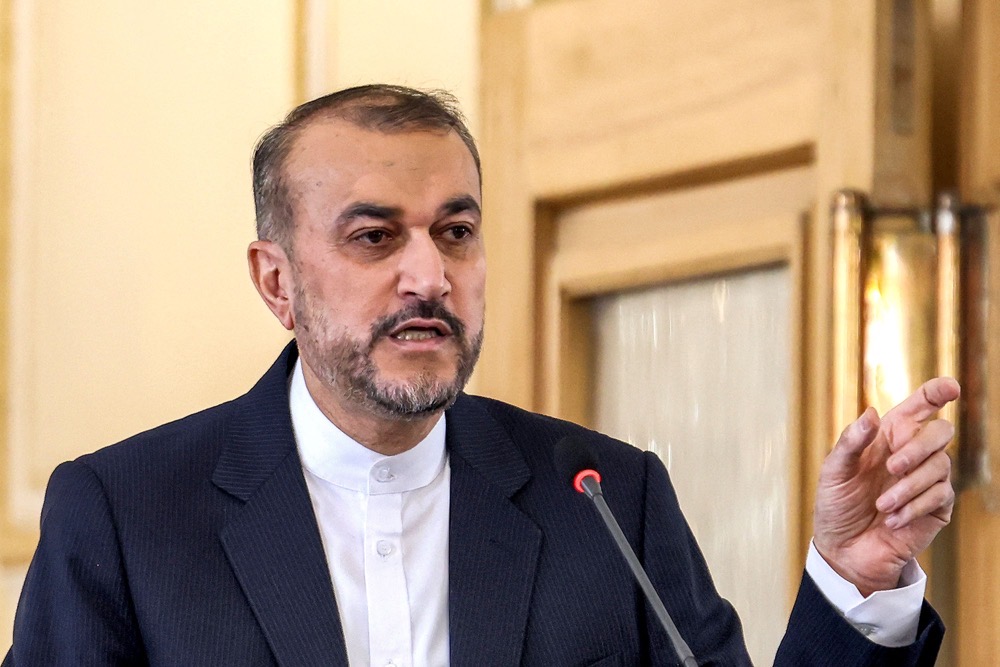
Foreign Minister Hossein Amir-Abdollahian. (AFP)
As the skies became busier, the potential for accidents grew. On July 18, 1967, Humberto de Alencar Castelo Branco, the first president of the Brazilian military dictatorship after the 1964 coup, died in a midair collision of Piper PA-23 aircraft near Fortaleza.
On May 27, 1979, Ahmed Ould Bouceif, the prime minister of Mauritania, died in a plane crash off the coast of Dakar, Senegal, and Francisco Sa Carneiro, who served as Portugal’s prime minister for only 11 months, died on Dec. 4, 1980.
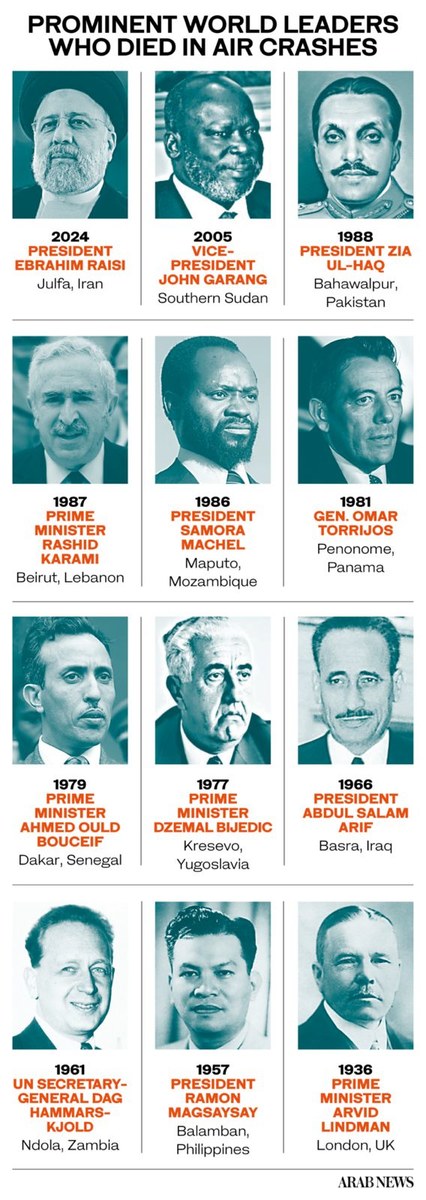
Not all crashes can be blamed on the weather or pilot error, however. In several cases, aircraft have been deliberately targeted as a means of killing their high-profile passengers.
Panamanian leader Gen. Omar Torrijos died on July 31, 1981, when his Panamanian Air Force plane crashed under suspicious circumstances.
On June 1, 1987, Lebanese statesman Rashid Karami, who served as prime minister eight times, was killed when a bomb detonated aboard his helicopter shortly after takeoff from Beirut.
In one particularly devastating incident, Rwandan President Juvenal Habyarimana and Burundian President Cyprien Ntaryamira were both killed on April 6, 1994, when their Dassault Falcon 50 9XR-NN was shot down while approaching Rwanda’s Kigali airport.
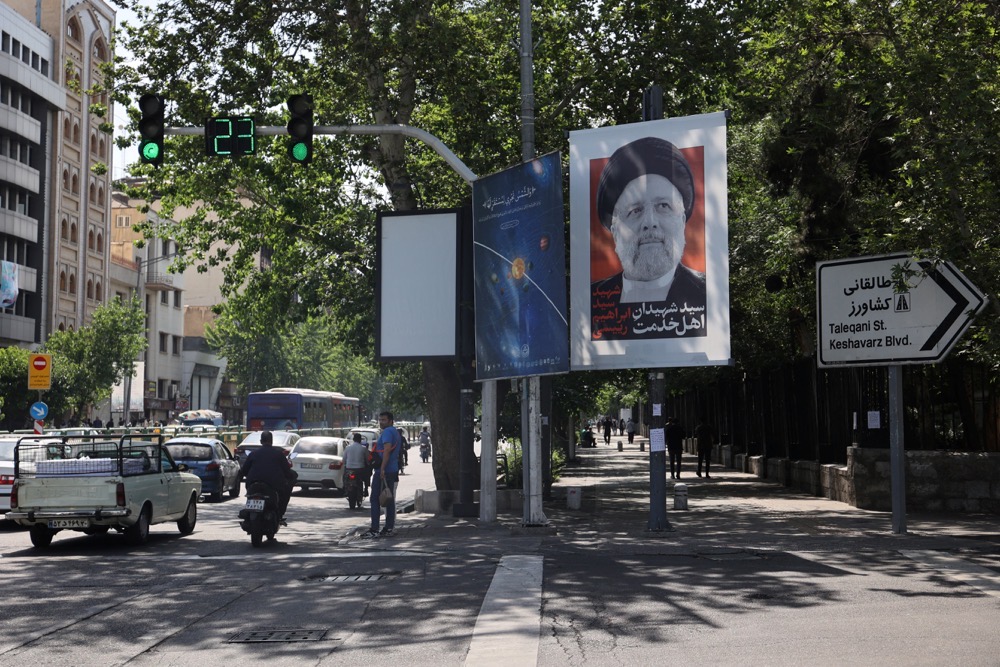
Iranians will observe five days of mourning for victims of the helicopter crash. (Reuters/West Asia News Agency)
There have been several investigations into the air crash that killed Pakistan’s Gen. Zia Ul-Haq on Aug. 17, 1988, but no satisfactory cause was found, leading to a flurry of assassination theories.
The Pakistani Air Force Lockheed C-130B crashed shortly after takeoff from Bahawalpur. According to investigators, the plane plunged from the sky and struck the ground with such force that it was blown to pieces and wreckage scattered over a wide area.
Despite vast improvements in aviation safety, disasters have continued to strike well into the new millennium.
On Feb. 26, 2004, Macedonian President Boris Trajkovski died when his Beechcraft Super King Air 200 Z3-BAB crashed while trying to land in poor weather at Mostar.
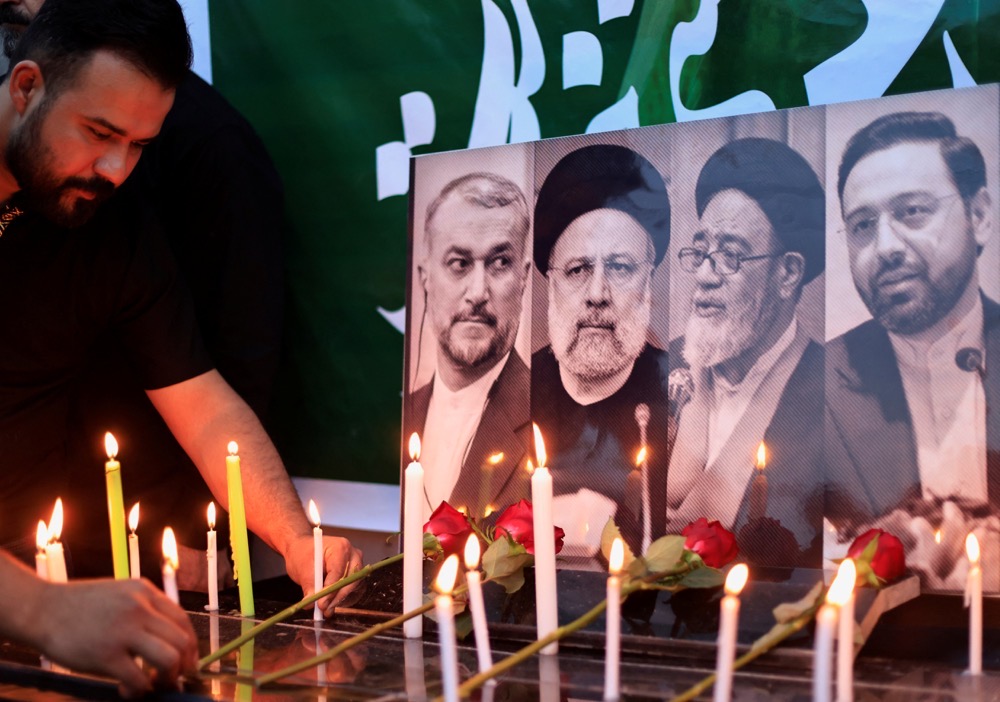
A man lights a candle to offer condolences outside the Iranian embassy, in Baghdad. (Reuters)
John Garang, leader of the Sudan People’s Liberation Army and briefly first vice president of Sudan, died when his helicopter crashed into a mountain range in the country’s south after getting caught in poor weather on July 30, 2005.
Muhammadu Maccido, the sultan of Sokoto in Nigeria, was killed alongside his son when his ADC Airlines Flight 53 crashed on Oct. 29, 2006, and Polish President Lech Kaczynski died on April 10, 2010, when his Tupolev-154 crashed in foggy weather when approaching Smolensk airport in western Russia.
In the latest incident prior to Raisi’s death, the deceased was actually at the controls when the aircraft got into difficulty. Chile’s former president, Sebastian Pinera, was killed on Feb. 6 this year when the Robinson R44 helicopter he was piloting crashed nose-first into Lake Ranco.

An Iranian woman holds a poster of President Ebrahim Raisi during a mourning ceremony in Tehran, Iran. (AP)
While this list of fatalities might give world leaders pause for thought as they step aboard their presidential jets on their next diplomatic outing, it is well worth remembering that modern air travel is statistically many times safer than traveling by road.
That said, an experienced pilot, an aircraft in good condition, a clear weather forecast, and a flight plan shrouded in secrecy would no doubt improve their odds of making a safe arrival.



